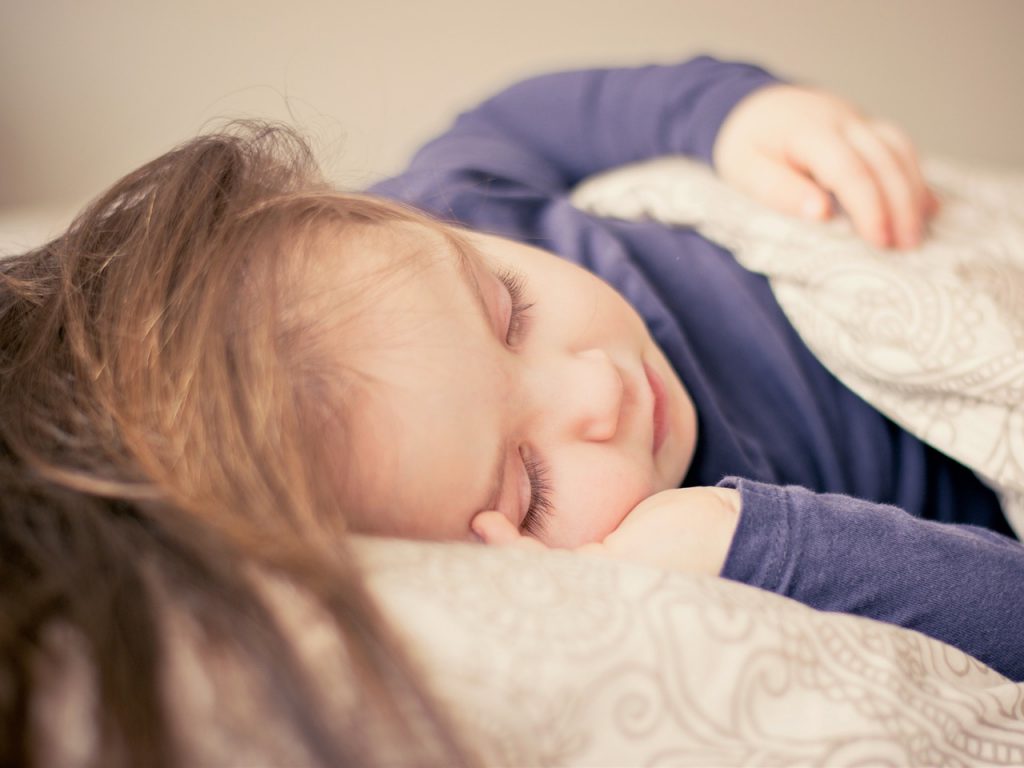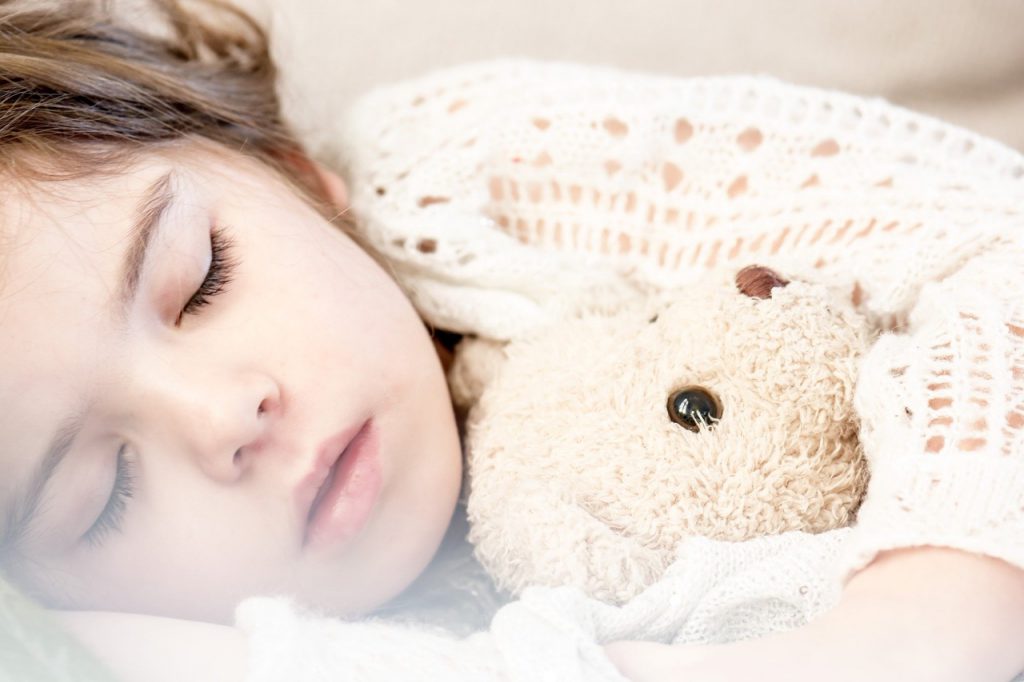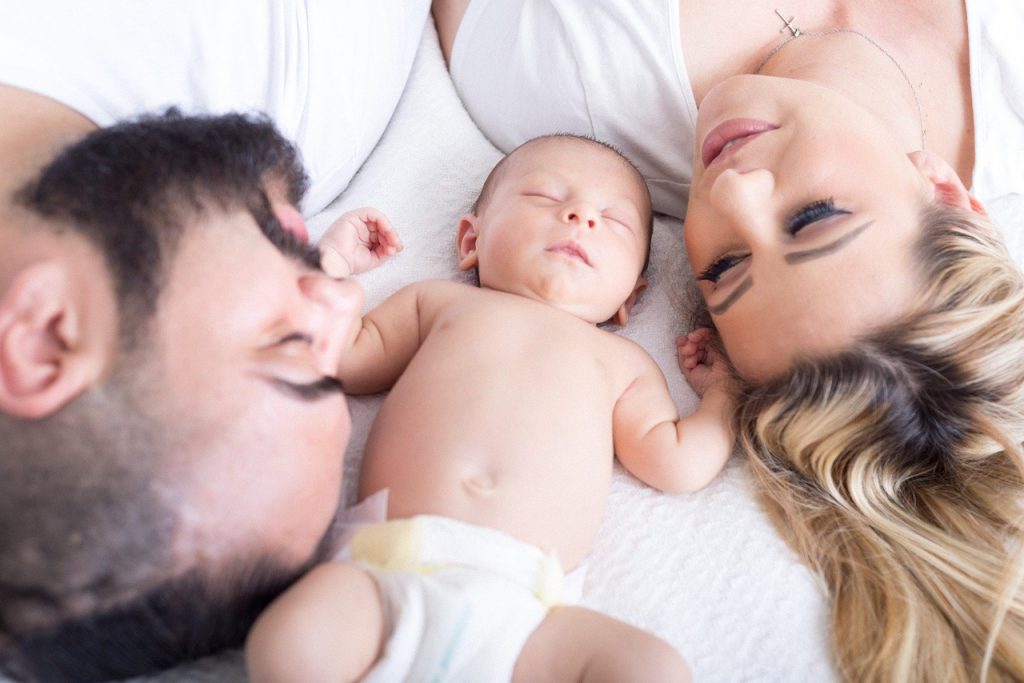How to Develop a Healthy Sleep Routine for your Kids
Before I became a parent, sleep was one of those topics that simply didn’t appear on my “Houston, we have problem” radar. It was just something that automatically happened at the end of each and every day (and sometimes in the middle – you can’t beat a blissful afternoon snooze on a Sunday). My routine was pretty simple, I’d get into bed, turn on the telly (a very bad practice before bedtime by the way – keep reading to find out just how bad), then I’d shut my eyes and travel to the land of nod before my head hit the pillow. My husband’s whispers of, ‘Honey, are you still watching this’ were always met with a drowsy, ‘Yes sweetheart’; because the alternative was the sound of a large stone being hit by a frying pan, or ‘golf’ as my husband calls it. Yes, a bit of carefully selected white noise was far better than that racket. Don’t judge me.

Long trips in the car, no problem, head back and asleep in a second. My husband would joke I’d probably fall asleep on a roller coaster ride. Funny but no comment (in case this became a date night thing).
Becoming a parent was a sleep game changer for both of us – from the moment my first little bundle of joy entered the world, sleep became hot topic number 1. The what, why’s, when’s and how’s of sleep were catapulted to the forefront of our thoughts and conversations – I even dreamt about sleep!
I remember frantically searching parent forums for answers to my countless questions; how much sleep should a new born baby be getting, is it normal for a baby to sleep all day and be awake all night, should I ignore the crying and get some sleep myself, why won’t my baby settle to sleep by themselves, can I buy general anaesthetic from Waitrose… the list went on and on!
Suddenly my regular sleep pattern of 8 (or so) uninterrupted hours was replaced by grabbing whatever sleep I could, whenever I could. My mantra, thanks to Winnie the Pooh, became “let’s start by taking a smallish nap or two”… and that was at breakfast time!
My children are now 12 and 14 and sleep is still a hot topic, mobile phones have possibly bumped it off 1st position, but seeing as the two are closely related (more on this later) sleep is still technically top of the list.
This week I’m discussing how we can help our kids to sleep better – because establishing a healthy sleep routine is so important, both for your children and yourself.

Why is sleep so important?
What is all the fuss about? Why is sleep so important? Sleep is a complex topic, it’s not just about routine, there’s some pretty incredible stuff happening within our bodies whilst we lay blissfully unaware.
During the early developmental years sleep is the primary activity of the brain. The sleep-wake cycle (also referred to as the Circadian rhythms, check me out with my scientific terms!), which is regulated by light and dark, is being established. This is why newborns have irregular sleep patterns, as their cycle is settling into a routine, which usually takes between 3-6 months.
By the age of 2 years most children have spent more time asleep than they have awake! Sleep is particularly important for children as it directly impacts their physical and mental development.
According to the National Sleep Foundation there are two alternating types of sleep;
Non-Rapid Eye Movement (NREM) or “quiet” sleep. During the deep states of NREM sleep, blood supply to the muscles is increased, energy is restored, tissue growth and repair occur, and important hormones are released for growth and development.
Rapid Eye Movement (REM) or “active” sleep. During REM sleep, our brains are active and dreaming occurs. Our bodies become immobile, breathing and heart rates are irregular.
As children grow and develop, their sleep patterns change, for example the National Sleep Foundation reports:
- Babies spend 50 percent of their time in each of these states and the sleep cycle is about 50 minutes.
- At about six months of age, REM sleep comprises about 30 percent of sleep.
- By the time children reach preschool age, the sleep cycle is about every 90 minutes.
One aspect that does continue through the childhood years is the importance of a healthy sleep routine, this is equally as important for a baby as it is for a teenager. Often the challenge for parents is knowing how we can adapt our own approach in order to help our children maintain a healthy sleep routine throughout their various stages of development. If you’ve drowsed off already, brilliant, otherwise keep reading.

What is good sleep?
All this talk about good sleep, but what does that actually mean? Good sleep is all about getting to sleep and staying asleep – that doesn’t sound too hard does it? However, there is a surprisingly high number of children who struggle to achieve good sleep, for a variety of reasons, which can lead parents to have further causes for concern.
A cross sectional study into how inadequate sleep in children affects brain activity and associated cognitive and behavioral outcomes, indicates that sleep deprivation may affect the developing brain of school age children.
Sleep expert and nursing professor Wendy Hall of the University of British Columbia recently led a review of the latest
“Good sleep hygiene gives children the best chances of getting adequate, healthy sleep every day. And healthy sleep is critical in promoting children’s growth and development,” said Hall. “Research tells us that kids who don’t get enough sleep on a consistent basis are more likely to have problems at school and develop more slowly than their peers who are getting enough sleep.”
studies into sleep hygiene, which includes practices like providing a cool and quiet sleeping environment or reading before bedtime to help kids unwind.
This research highlights that there is a connection between good sleep and a healthy developing brain, therefore it’s so important that we help to establish the best possible environment for our kids to get a good night’s sleep.
How much sleep do children need?
If you’re unsure about how much sleep your child should be getting, the table below shows what the experts recommend (approximate hours as recommended by Millpond Children’s Sleep Clinic):

How can I help my child sleep?
- Establish a bedtime routine for your child
A regular bedtime routine, starting around the same time each night, encourages good sleep patterns. A routine could consist of a bath and story before bed, this can help younger children feel more relaxed and ready for sleep. For older children, the routine might include a chat with you about their day and preparing for the next, then some time alone relaxing with some music (so long as it’s not thrash metal!) or reading a book.
Hall summarises;
“We found good-to-strong endorsement of certain sleep hygiene practices for younger kids and
school-age kids: regular bedtimes, reading before bed, having a quiet bedroom, and self-soothing, where you give them opportunities to go to sleep and go back to sleep on their own, if they wake up in the middle of the night,”
A bedtime routine can consist of a few activities, the key is to do similar activities in roughly the same way each night, starting around 20 minutes before your child’s bedtime.
- Help your child to relax before bedtime
Encourage your child to relax before bedtime – this may be easier said than done, many households are busy and buzzing, a hive of activity, but if you can instil an air of calm before bedtime it can really help. If your child takes longer than 30 minutes to fall asleep, they might need a longer wind-down time before turning the lights out to go to sleep.
Hall and co-author Elizabeth Nethery, a nursing PhD student at UBC, also found extensive evidence for limiting technology use just before bedtime, or during the night when kids are supposed to be sleeping.
Studies in Japan, New Zealand and the United States showed that the more exposure kids had to electronic media around bedtime, the less sleep they had.
Hall comments;
”One big problem with school-age children is it can take them a long time to get to sleep, so avoiding activities like playing video games or watching exciting movies before bedtime was important”.
Blue light from televisions (here it is… really bad!), computer screens, phones and tablets might suppress *melatonin levels and delay sleepiness. It probably helps to turn these off at least one hour before bedtime and to keep screens out of your child’s room at night.
*Melatonin is the hormone in our bodies that regulates our sleep-wake cycles. Melatonin good, TV bad.
Here are a few simple steps that you could take:
- Phone and media usage could be stopped 1 hour before bedtime
- Do not allow TV’s / phones / media to be kept in your child’s room overnight
- Set parental controls that limit the number of hours spent on social media apps and set a time that locks the phone
- Keep regular sleep and wake times for your child
Try to keep your child’s bedtimes and wake-up times within 1-2 hours of each other each day. This consistency helps to keep your child’s body clock in a regular pattern.
- Keep older children’s naps early and short
Most children stop napping at 3-5 years of age (it’s ok kids, napping becomes acceptable again when you get older!) If your child is still napping during the day try to keep the nap to no longer than 30 minutes and keep it earlier in the day. Longer and later naps can make it harder for children to get to sleep at night.
- Check your child’s bedroom environment
A quiet, dimly lit space is important for good sleep. If your child’s bedroom is too light or noisy it could have a negative impact on their sleep. As mentioned above, it’s good practice to remove phones and tablets from your child’s room overnight to reduce any blue light from these devices.
- Make sure your child feels safe at night
If your child feels scared about going to bed or being in the dark you could use a nightlight in the room to offer low level light. Reassure them and praise them when they settle to sleep on their own. Try and avoid stories or films that would make them feel scared – perhaps have a go at making Cuckooland’s unique Anti Nightmare Mist!
- Consider your child’s diet and eating times
Try to make your child’s evening meal at a reasonable time before their bedtime and limit sugary snacks before bed. In my article about food and sleep we saw that what we eat can effect our sleep. Interestingly a study in New Zealand showed that family dinner time was critical to helping adolescents sleep.
- Encourage your children to get plenty of exercise
Evidence has shown that exercise does have a positive impact on sleep. In fact, as little as 10 minutes of aerobic exercise can dramatically improve sleep quality by increasing the amount of slow wave sleep (deep sleep) you get. Deep sleep is important because it is during this phase that the brain and the body rejuvenate. For children, achieving the right level of deep sleep is vital to aid their growth and development.
- Avoid caffeine
Surprisingly, there isn’t a lot of evidence linking caffeine use before bedtime to poor sleep; it appeared to be the total intake during the day that matters more. Caffeine is in energy drinks, coffee, tea, chocolate and cola. So it’s best to limit your child’s intake over the course of the day. Personally, I would advise against a caffeine drink or snack just before bed time too.
- Make sure that both your child’s bed and mattress are comfortable
Only last week I wrote an article about how often you should replace your child’s mattress, if you missed it you can find it here. Lastly, but by no means least, ensuring that your child has a comfortable, practical and of course out of this world bed can go a long way in helping them sleep well – for inspiration jump over to cuckooland.com where you’ll find some truly amazing kids beds.
All this talk about sleep is making me feel snoozy! Thankfully its past my bedtime and my Hubby hasn’t grabbed the remote yet so it’s off to the land of nod with the wicked white noise witch of the west (we all have our vices as long as they’re not mobile devices. Hmm, I think I’ll coin that phrase. Ok, give me a break its late).



